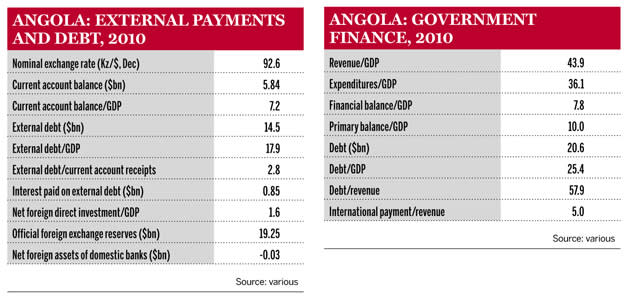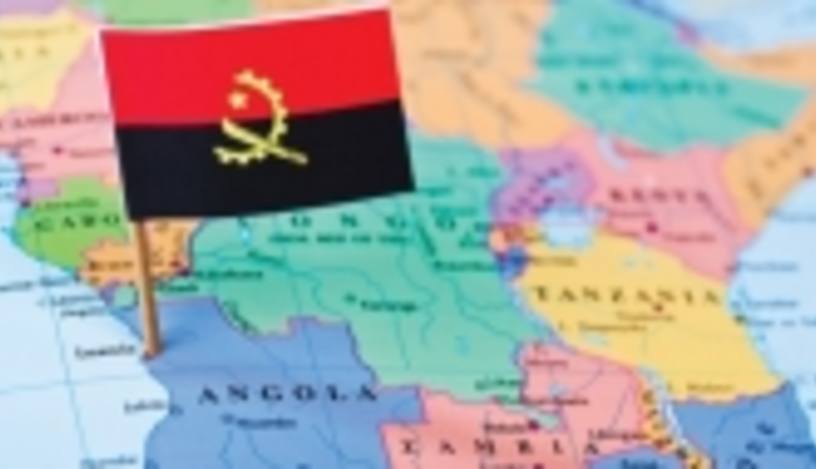There is a distinct mood of optimism in Angola. With oil prices likely to remain high, its budget and current account are expected to be in surplus by the end of the year, inflation is falling and the currency remains stable.
Editor's choice
This is encouraging international investors to look at opportunities in the country and ratings agencies to make positive noises about the government’s strategy. The stage appears set for a ratings revaluation based on the growing confidence that the country is set on the path for sustainable growth. There is also little doubt the ruling MPLA, which was originally a party of the left, has now fully embraced the market economy.
This should generate the revenue that can then be invested in improving an infrastructure which has been ravaged by a 27-year civil war, and also used to finance the diversification of an economy that is currently almost totally dependent on oil.
The critical question is what will happen to the oil price. Angola has budgeted for $77 a barrel but this is a conservative assessment compared with widespread expectations that it will remain at $100 a barrel or above. This will enable Angola to increase capital spending, build up reserves and put money into a sovereign wealth fund while remaining in surplus.

Strong position
It will certainly leave the government in a much stronger position than it found itself in only a few years ago. In the middle part of the last decade, with oil prices high, Angola delivered three years of 15% to 20% annual growth, which put it among the fastest growing countries in the world.
But the boom years were brought to a painful halt by the sharp fall in oil prices between the second half of 2008 and the first quarter of 2009. This led to a sharp fall in the growth rate to 2.7%, while macroeconomic instability re-emerged and the fiscal and current accounts moved into large deficits despite significant cuts in government spending.
There is strong belief among diplomats in Luanda, as well as the bankers and business leaders, that investment opportunities in the country demonstrate that Angola's government has learned the lesson of what happens when there is a collapse in the price of a commodity that provides three quarters of its revenue and accounts for 96% of merchandise exports.
“I don’t think they will make the same mistakes again. They will take a much more cautious approach to spending in the next few years and ensure that they are able to cope with any fall in the oil price. Consequently, development and growth should be much more sustainable,” said one diplomat.
Bankers have also been convinced that the government has gone a long way towards getting the correct balance of policies for attracting investors. “Angola is a great story for an investor to get involved in. As a country it is about as good as it gets in southern Africa. There is political stability with the president potentially running again and being re-elected next year while the economy is growing very fast – and the economy’s strength will be further boosted by continued high oil prices,” says Florian Hartig, global head of debt capital markets at Standard Bank.
The prize is considerable. Ratings agencies are finalising reports on Angola which are expected to deliver a significant uprating from B+ to possibly BB- and pave the way for the country to raise at least $500m in the Eurobond market.
The bond was planned a couple of years ago when there was talk of raising up to $1.5bn but it was dropped when oil prices fell. However, bankers believe that the combination of strong oil prices and a considerable and growing appetite for African sovereign risk will enable Angola to raise money at comparable rates to Senegal or Nigeria.
Profit in peace
This achievement is all the more remarkable given the state the country was in less than a decade ago. By 2002, Angola had suffered 27 years of a civil war that began when the country gained independence from Portugal.
The war had a devastating impact on the country, almost completely destroying its roads, rail, post and telecommunications systems. Industry was ruined and from being a net exporter of agriculture, Angola became an importer with Luanda’s supermarkets full of goods imported from South Africa, Portugal and Brazil.
The loss of life was considerable, with those who wanted to escape the fighting fleeing to Luanda – and although the capital was not touched directly by the war, its infrastructure could not cope with the influx of so many people. Today half of Angola's population, of a country two and a half times the size of France, live in Luanda.
The war also led to the exodus of a middle class of administrators, teachers, doctors and lawyers, though many of those who fled the country are starting to return.
Rebuilding process
There are now signs that infrastructure is being rebuilt, whether it be the Benguela Railway project, the telecommunications system, where the mobile network at least operates efficiently, or the growing number of office blocks and luxury flats. The Luandan suburb of Talatona, with its football stadium, business park and five-star hotel, is also an indication that the long process of reconstruction has restarted following the two-year hiatus.
There are also signs that Angola will develop not just its oil and diamonds sector but also the many other rare minerals it possesses, such as beryllium, clay, copper, gold, gypsum, iron ore, lead, lignite, manganese, mica, nickel, peat, phosphate rock, quartz, silver, tungsten, uranium, vanadium, wolfram and zinc.
Despite the discrepancy between wealthy entrepreneurs and those living in extreme poverty, there appears to be no threat that the desire for regime change in northern Africa has affected Angola. President Eduardo Jose dos Santos has already been in power for 31 years and is expected to stand in next year’s presidential election – in the last poll in 2008 he was elected with 81.73% of the vote. There are also signs that the old divisions between the victorious MPLA and the losing Unita forces matter less, with several Unita figures holding senior positions in the government and armed forces.

Challenges remain
Despite the political and economic stability in the country there are many challenges ahead if Angola is to take full advantage of the opportunities provided by its oil wealth. The economy remains vulnerable to any change in the oil price, but the main difficulties – which have been identified by the government itself – remain the bureaucracy, the lack of transparency and dealing with corruption.
Speaking two years ago, the president announced that there would be a “zero-tolerance” strategy towards corruption. There is an audit of public finances being carried out with consultants Ernst & Young and banks are also introducing much stricter due diligence on those opening bank accounts. Anti-money laundering and financial transactions legislation was introduced last year, with prison sentences of up to 24 years, enabling Angola to be taken off the Financial Action Task Force list.
And even though the country still languishes at 164th out of 178 countries on Transparency International’s Corruption Perception Index for 2010, diplomats believe Angola is headed in the right direction. “I am certain that the government has the desire and determination to deal with bad management and corruption,” says one.
Angola is also a far from easy country in which to do business, with a ranking of 163 out of 183 countries in the World Bank’s 2010 Ease of Doing Business Index. The bureaucracy works extremely slowly, and setting up a new business can be extremely expensive. However those who have done so recently say that the situation is improving. For those that do, the potential rewards seem to be well worth the wait.












